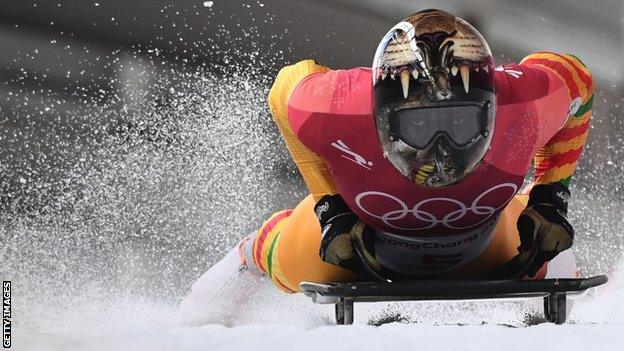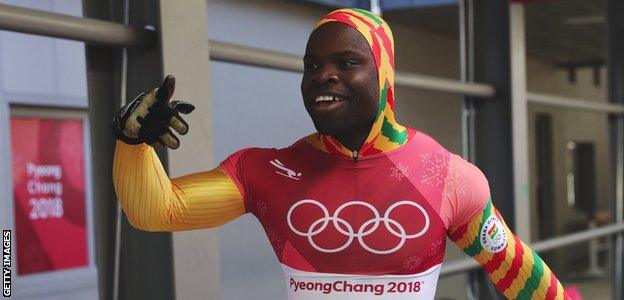Beijing 2022: Akwasi Frimpong 'powerless' after skeleton rule change
- Published

Akwasi Frimpong finished 30th on his Winter Olympic debut in Pyeongchang in 2018
Ghanaian skeleton racer Akwasi Frimpong says he feels "powerless" after rule changes ultimately cost him a place at the Beijing 2022 Winter Olympics.
The 35-year-old went to the Pyeongchang Games in 2018 after qualifying via the International Bobsleigh and Skeleton Federation's (IBSF) continental quota system, which has since been scrapped.
Frimpong and his coaches have called for a last-minute change from his sport's governing body and the International Olympic Committee (IOC) to allow him to compete - but the IOC says it is not possible to change entry rules at the last minute.
However, Frimpong says it is vital to have athletes from every continent taking part at the Games in order to grow the sport.
"People will never understand the uphill battle we as African athletes in winter sports face, just to participate," Frimpong said.
"The people making the rules must make the changes now or it will be too late. Africa is watching and the world is taking notice."
The IBSF told the BBC that the continental quota system had been replaced as part of a full revision of its qualification process.
Smaller nations have 'huge disadvantage'

Frimpong, who has dual Dutch nationality, is based in Utah
The skeleton is a technical, difficult and high-speed sport that sees competitors sliding head first down an ice track at speeds of up to 80mph.
Frimpong was on course for regular qualification for Beijing until a Covid infection forced him out of competition at the key moment at the start of last month.
In previous years he still might have been able to go to the Games, as every continent was effectively guaranteed some representation.
But IBSF rules for 2022 do not allow that route, leaving Frimpong out in the cold and believing the change has a damaging impact.
"The 2022 Winter Olympic Games quotas don't encourage diversity in winter sport," Frimpong told BBC Sport Africa.
"The quotas set in place put smaller nations at a huge disadvantage, especially Africa sliders working hard to represent a continent of more than 1.2 billion people.
"There is no level playing field when everyone else has almost a 100-year head start on their development."
The Ghanaian said he felt "powerless and helpless" in the face of a situation where "Africa does not have a seat at the table".
"Each continent should be able to send their very best in each event as long as the athlete is qualified to safely compete in his or her respective sport," he added.
Frimpong calls for 'solidarity and Olympic spirit'
In replacing the continental quota system, the IBSF said it had brought in "a more expansive development program that focused on emerging nations and equally on gender equity in supporting athletes on their qualification pathway".
It pointed to the recent women's skeleton World Cup, where athletes from Australia, Brazil and the Netherlands featured prominently.
Competitors from Ghana, Cambodia, Malaysia, Puerto Rico and Vietnam were among those who attended a recent development event in the USA, according to the IBSF website.
The IOC said it understood the difficulties faced by athletes, such as Frimpong, who had been impacted by the pandemic.
It said the qualification rules for Beijing had been set since 2019 and it was not possible to change them at the last moment.
"The IOC fully supports diversity and inclusion in the Olympic Games, as well as clear and fair qualification systems that apply equally to all athletes wishing to qualify," a statement said.
But the IOC acknowledged that diversity "is not necessarily reflected at each discipline level in every sport" and it encouraged members of the IBSF's athletes commission to address the issue for the future.
Frimpong, a former sprinter who also has Dutch nationality, says he has already gone down that route, but has so far not been able to get the IBSF to change course.
He is not the only competitor to try to challenge the system. Athletes from the Republic of Ireland and Israel have recently failed in their attempts to claim places at the Games in bobsleigh and skeleton.
Both countries took their case to the Court of Arbitration for Sport's ad hoc division in Beijing, but their appeals were rejected on Tuesday, with reasons for the decisions yet to be given.
Akwasi Frimpong: Meet Ghana's Olympic skeleton athlete
Instead of putting the final touches to his technique and fitness, Frimpong is preparing to watch the Beijing Games on television.
He is keen to stress that, on a personal level, he has always been supported by the IBSF - but he wants to grow the sport beyond its usual boundaries and says much needs to change if that is to happen.
Frimpong has already been working with other athletes who might feature for countries not usually represented in winter sports, including Nigeria, India and his native Ghana.
He says the difficulties those competitors face are only increased if top competitors like him cannot secure a place at the Games.
"If any African child was inspired by me to get into winter sport, and then they see that even with my hardest work, I can't make it to the Olympics, they will stop trying," he said.
"We can and must do better in the name of solidarity and the Olympic spirit."
Six Africans competing at Beijing 2022
Shannon Abeda (Eritrea) - Alpine skiing
Carlos Maeder (Ghana) - Alpine skiing
Mathieu Neumuller (Madagascar) - Alpine skiing
Mialitiana Clerc (Madagascar) - Alpine skiing
Samuel Ikpefan (Nigeria) - Cross country skiing
Yassine Aouich (Morocco) - Alpine skiing